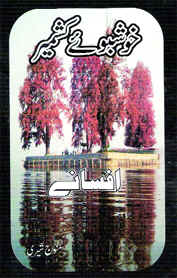Adarsh Ajit
‘Some things are beyond evaluation. Home is one among them’.
Manoj Sheeri, a KPS officer, in his debut book of stories, Khushbo-e-Kashmir has tried to bring issues of diverse forms of love into a universal profile but under local covering. He has also exposed the rotting socio-cultural ethics in his stories.
In ‘Gold Medal’, Ghulam Mohi-u-din, a peon of a district hospital toils hard to make his son, Ikhlaq, a doctor. He spends everything, at the cost of his financial security, on him, as he considers his son as a treasure of treasures. Ikhlaq completes the course and gets a gold medal. His father frames the medal and puts it on a front wall. Unfortunately he receives the first shock from his son when he comes to know about his intensions to leave the valley and work in Saudi Arab. Reluctantly, he allows Ikhlaq to take his everything to Arab except the gold medal. Mohi-u-din gets another shock on hearing the news of his son’s marriage in Arab. Dejected and depressed Mohi-u-din expresses his dismay.
‘Had I not educated my son, he would have been here with me’
Even on hearing the news of the ill health of his mother, Ikhlaq does not come to see them. Mother dies. Out of continued shocks, Mohi-u-din spits on the medal as if he was spitting on his son’s face.
The trauma, miseries, tortures, struggle for survival, dispersal, the unprecedented increase in inter-caste marriages and erosion of cultural values are depicted in the story October 2002 in which Heemal, a central character, and a displaced Kashmiri Pandit woman goes through the unusual experiences of her most sorrowful years of displacement.
An interesting story has been built on a Hindu woman who is blind and is living lonely in a big house in Kashmir. Ali develops relations with her and becomes frequent visitor to her house. Ali is a militant and the blind woman is unaware about it. One day, police raids the house and finds arms and ammunition there. The two, Ali and the blind woman, are arrested. A new, mostly unpredicted reality comes out. Ali and the blind woman are ready to die for each other as they are bonded together in a son and mother relationship. Police does not buy this story and failing to unravel the truth, they treat them as mentally imbalanced and send them to a lunatic asylum.
The story Doctor Sahab unveils the conditions that compel Dr. Avtar Krishen to prepare for leaving the valley. He cures the militant and the army men get suspicious and begin enquiry. He attends to injured army man and is suspected by the militant organizations. Despite all odds, he proves to be a true and dutiful doctor who treats all, irrespective of colour, creed, section and community. He is now thought as an indispensable asset for the people. Suspicions against him cease and he is loved by one and all. He abandons the idea of leaving Kashmir.
Toofan is the story of a beautiful fisherwoman who dreams to become another Habba Khatoon, in wait of a king to marry her. She leaves selling fish as she hopes that Shaukat, the son of a shopkeeper loves her and will be informing her soon about it. But her dreams shatter when she receives the news of Shaukat marrying another girl. On that day, she does not come home. Searching every corner and every tide of the lake, her parents think of her committing suicide. But amazingly she appears again next morning only to sell the fish afresh.
Apna Apna Karb is a story of Ghar Devta narrating different tales of vacant houses of a mohalla to a thief who takes shelter on verandah there. Ghar Devta pleads him to unlock the door and free him so that he searches the masters of the house who have left this mohalla due to rising atrocities. On hearing the incessant cries, sighs, robbery, rapes and negative trends in this mohalla during the night the thief comments:
‘This is not a mohalla but a hell’.
Ghar Devta replies to him:
‘This was not a hell. The mohalla was no less than a heaven’
In Ghar, Abdul Rahim, a carpenter, wants his aspirations to be fulfilled by constructing his own house. On the advice of a teacher called Master Ji he insures the new house which is extremely stunning, architecturally unparallel and technically perfect. The insurance surveyor estimates the policy to the sum of Rs 5 lakhs, the highest in the rural areas. Cross firing engulfs the vicinity. Rahim’s house guts to rashes. After coming out of the shock he visits the insurance company along with Master Ji. The manager rejects the claim terming it too high to be sanctioned. Rahim revisits next morning. The manager hands over Rahim to the police. The police think him as a weird man, gone mad due to losing of a home. Mater Ji succeeds in releasing him on bail. Rahim collects the pieces of wood in the remains and makes a model of his house. He goes gain to the insurance office. Claim is settled. Manager appeals him to donate the model to the company and he allows it on a condition. He suggests them to write on the model:
‘Some things are beyond evaluation. Home is one among them’.
On the whole the book, Khushbo-e-Kashmir, is a successful endeavour of the author. There are a few plots that have procedural errors. The craft of stories gives obvious perfume of Kashmiri soil. Sheeri has not missed any beautiful gesture of scenic Kashmir. Sheeri’s stories straightway pursue the social feature. Mohamad Zaman Azarda in his foreword comments:
‘The stories are the mirror of socio-political and economical lives’.


